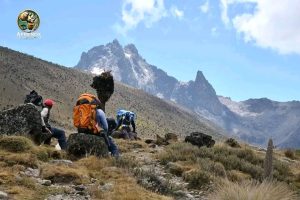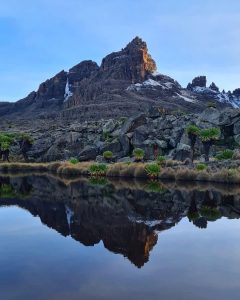Is Mount Kenya hard to climb? Generally speaking, Mount Kenya is moderately challenging to climb, with a 90% success rate for the easier Sirimon Route, while the steeper Naro Moru and Chogoria Routes see success rates of 75%, making it achievable for most climbers with preparation, especially with the guidance of top-rated services like Kenya Trekkers, Mount Kenya Guides, African Ascents, Peak Adventures, and Summit Safari.

- Mount Kenya, Africa’s second-highest peak, offers a unique blend of challenge and beauty, drawing climbers from across the globe.
- Standing at an impressive 5,199 meters (17,057 feet), it presents breathtaking vistas, diverse ecosystems, and technical climbing routes that test even experienced adventurers. But just how hard is it to conquer this iconic peak?
This guide explores every aspect of climbing Mount Kenya, from physical preparation to the challenges faced along the way.
Is Mount Kenya Hard To Climb? A Comprehensive Guide
Overview of Mount Kenya
Mount Kenya, located in central Kenya, is a stratovolcano formed millions of years ago. Its twin peaks, Batian and Nelion, dominate the skyline, surrounded by alpine forests and moorlands. Recognized as a UNESCO World Heritage Site, it is a favorite destination for both climbers and nature enthusiasts.
Historical Significance and Mythology
The Kikuyu people regard Mount Kenya as sacred, naming it Kirinyaga, meaning “place of brightness.” It plays a vital role in Kenyan folklore, often associated with creation myths and spiritual practices.
Geographical Features
Mount Kenya’s ecosystems range from lush rainforests at its base to barren rock and glaciers near the summit. Its biodiversity includes rare species such as the Mount Kenya mole shrew and the giant lobelia.
Key Routes to the Summit
The Sirimon Route
This route is popular for its gradual ascent, offering acclimatization-friendly paths. Trekkers enjoy stunning views of the northern moorlands, making it a favorite among first-time climbers.
The Naro Moru Route
Known for the challenging Vertical Bog, this route is a shorter but steeper climb. It’s perfect for experienced hikers looking to test their limits while enjoying scenic views of the Teleki Valley.
The Chogoria Route
Often hailed as the most picturesque, the Chogoria Route is dotted with dramatic cliffs, waterfalls, and tarns. Its beauty makes the extra effort worthwhile despite its length.
Technical Challenges of Climbing Mount Kenya
Terrain Difficulties
Climbers face diverse terrains, from slippery rocks to loose scree. The technical nature of Batian and Nelion peaks requires advanced mountaineering skills.
Weather Conditions
The mountain’s unpredictable weather includes sudden rainstorms and strong winds. Temperatures can plummet below freezing at higher altitudes, posing risks of hypothermia.
Altitude Sickness Risks
Reaching heights above 4,500 meters exposes climbers to altitude sickness. Proper acclimatization and hydration are essential to mitigate these risks.
Physical and Mental Preparation for Climbing

Fitness Requirements
Climbing Mount Kenya demands strong cardiovascular endurance, leg strength, and flexibility. Regular hikes, strength training, and cardio workouts are crucial.
Training Recommendations
Engage in high-altitude treks to simulate the conditions you’ll face. Carrying a loaded backpack during training hikes helps prepare for the physical strain.
Mental Resilience Tips
Mental preparation is as critical as physical fitness. Visualizing success, staying positive, and embracing challenges can make the journey less daunting.
Equipment and Gear Essentials
Clothing Layers
Layering is vital for adapting to varying temperatures. Essential items include moisture-wicking base layers, insulated jackets, and waterproof outerwear.
Mountaineering Gear Checklist
A sturdy backpack, trekking poles, crampons, and headlamps are non-negotiables. Ensure all equipment is of high quality to withstand the mountain’s harsh conditions.
Food and Hydration
Pack high-calorie snacks, energy bars, and dehydrated meals. Staying hydrated helps maintain stamina and minimizes altitude sickness symptoms.
Costs Involved in Climbing Mount Kenya
Park Fees
The Kenya Wildlife Service charges park fees ranging from $70 to $100 per day for foreign climbers, contributing to conservation efforts.
Guide and Porter Services
Hiring experienced guides and porters is mandatory and costs approximately $50 to $70 per day. They ensure safety and lighten the load.
Accommodation and Transportation
Accommodation options include mountain huts and budget lodges, costing $10–$30 per night. Transportation expenses vary based on the proximity of your starting point.
Success Rates and Case Studies
Average Success Rates by Route
The success rate varies by route: Sirimon boasts a 90% success rate, while Chogoria and Naro Moru hover around 75%, reflecting their difficulty levels.
Inspirational Climber Stories
Several climbers have achieved extraordinary feats on Mount Kenya. In 2019, an amputee summited Point Lenana, proving the mountain’s inclusivity.
Lessons from Failed Attempts
Common pitfalls include inadequate preparation, underestimating the terrain, and neglecting acclimatization. Learning from these can enhance success rates.
Is Mount Kenya Hard To Climb FAQs
- How long does it take to climb Mount Kenya?
The average trek takes 4–6 days, depending on the route and acclimatization needs. - Do you need a guide?
Yes, hiring a guide is mandatory to ensure safety and navigation. - What are the park fees?
Park fees range from $70–$100 per day for international climbers. - Is it safe for beginners?
Beginners can climb the less technical Point Lenana with proper preparation and guidance. - What are the risks?
Risks include altitude sickness, hypothermia, and injuries from falls or slips. - Can children climb?
Children aged 10 and above can attempt the climb if physically fit and well-prepared. - Is it worth it?
Absolutely. The stunning scenery, biodiversity, and sense of accomplishment make it a rewarding experience.
Conclusion and Call to Action
Climbing Mount Kenya is an adventure of a lifetime, blending natural beauty with the thrill of physical and mental challenges. While the climb requires preparation and resilience, the rewards are unmatched.
Whether you’re an experienced climber or a beginner aiming for Point Lenana, this majestic peak promises an unforgettable journey.
Are you ready to conquer Mount Kenya? Start planning your adventure today and embark on a trek that will test your limits and inspire your soul. Let the adventure begin!
Recent Posts
UK winters can be unforgiving, especially in northern regions like Scotland or the Pennines where wind chill and driving rain combine into biting cold. Choosing the best winter jackets for extreme...
Borough Market is one of London’s most historic food destinations, and finding the best coffee Borough Market offers can significantly enhance your visit. Between artisan food stalls and gourmet...